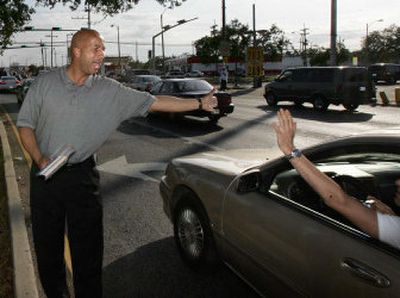New Orleans vote: Big uneasy

NEW ORLEANS – No one has a firm idea where the voters in this half-destroyed city are, and as the mayoral election neared its climax today, the unpredictability was putting clear strains on everyone involved.
Election organizers, required to make ballots available to eligible voters, say they have done all they can but are bracing for voting rights lawsuits. They have documented – even filmed – their own outreach activities for later court appearances.
Pollsters have struggled to find voters – particularly black ones – complicating any predictions. As for the candidates, they say they have been forced back to American electioneering basics, and on Friday morning, the three front-runners found themselves lurching into traffic at the exact same spot.
Commuters near the Crescent City Connection bridge, a busy bottleneck, were treated to appearances by Mayor Ray Nagin and his most prominent challengers, Lt. Gov. Mitch Landrieu and zoo and aquarium executive Ron Forman.
“You’ve got to run until 8 p.m. tomorrow, because we just don’t know who will show up,” Nagin said, guzzling a Gatorade and taking a minute to talk because the light was green. “Some of the conventional electioneering won’t work anymore. You just have to keep working until you pass out.”
Chief among the issues for voters, of course, were hurricane and rebuilding matters: which neighborhoods will receive city services, how strong the levees will be, the fate of abandoned houses and whether the city is going broke. None of the candidates could give definitive answers to all of those questions because so much depends on the federal and state governments.
Each candidate instead has tried to assert that he would be the problem solver that would do best by the city. But making their qualifications known has proven particularly difficult, largely because so many voters are scattered around the country and hard to locate.
While candidates are typically reluctant to say how they’re reaching voters, the challenges facing pollsters suggest the magnitude of the task.
Pollsters generally believe that about half of the voters today will be black, but locating them has been difficult. In one of the most recent polls, organized by Tulane University, 571 people were contacted, about two-thirds of them white.
Because blacks had been “undersampled,” the results had to be weighted to fit the assumption that on election day, voters will be evenly split between blacks and whites.
“So many of them (blacks) are evacuated,” said Brian Brox, an assistant political science professor at Tulane University, who conducted the poll with a colleague. “So many who are back are not living where they used to. We were having trouble finding them on the phone.”
The poll showed Landrieu leading the race with 26 percent, Nagin second with 21.4 percent and Forman third with 17.9 percent. More than 17 percent of voters said they were still undecided.
As other polls have, the Tulane survey demonstrated the importance of race. A little more than 43 percent of African American respondents chose Nagin; he received the support of only 5 percent of white respondents.
The question of whether elections organizers have done enough to reach black voters has already been the subject of more than one lawsuit, and many expect that if the results today are at all close, more will follow.
To prepare for the potential lawsuits, elections officials have taken photographs of the signs that will redirect voters from closed polling locations, logged every phone call to their toll-free hotline and filmed the delivery of voting machines to polling places.
“We have done everything humanly possible” to reach voters, Secretary of State Al Ater said. “We feel very confident that those who want to vote, can.”